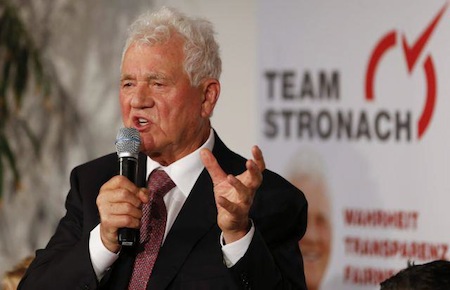It takes some brass for anyone, even a billionaire, to come to Austria after a lifetime in Canada thinking he can revolutionize politics, least of all as a know-it-all North American running against the euro — a monetary project infused with much more emotional and social content than just economics. ![]()
But brass runs strong in the Stronach family, and although Belinda Stronach took Canada by storm a few years ago — first as a candidate for leader of the Conservative Party and later as a minister in Paul Martin’s ill-fated Liberal government before she crashed and burned when the Liberals lost the 2006 federal election — her father, Frank Stronach, mostly seemed content as the chairman of Magna International, the hugely successful Canadian auto parts company that he founded.
Stronach, a citizen of both Canada and Austria, came to Canada at age 18 from Austria and, while he’s had an incredibly philanthropic footprint in Austria, he’s always been better known as an international businessman and billionaire than as a politician.
Until last year, when, after retiring as Magna’s chairman in 2011, Stronach founded a new party in Austria, Team Stronach, that had its first test in local elections Sunday in Lower Austria and Carinthia, two of Austria’s nine states. The party, which promotes classical liberalism, supports an all-volunteer army (despite a January 2013 referendum in which Austrians voted 60 to 40% to retain its current conscription force), a 25% flat tax on national incomes and, most controversially, the reintroduction of the Austrian shilling. Unlike many far right parties in Austria and in Europe, however, Stronach’s party is pro-immigrant and, except as regards the euro, fairly pro-Europe.
The name of Frank’s new party, ‘Team Stronach’ tells you everything you need to know about the movement — it’s more an 80-year-old man’s legacy project than a protest movement like, say, Beppe Grillo’s near-revolutionary Movimento 5 Stelle (Five Star Movement) in Italy. Even in Prague, foreign minister Karel Schwarzenberg is taken more seriously despite charges of carpetbagging — he lost the recent Czech presidential election in part because he spent over four decades of his early life outside Czechoslovakia / the Czech Republic (in Austria, of all places).
Despite a colorful collection of small parties, politics in Austria, a relatively wealthy Central European country of 8.5 million, remains essentially dominated by two parties — the center-left Sozialdemokratische Partei Österreichs (SPÖ, the Social Democratic Party) and the Christian democratic Österreichische Volkspartei (ÖVP, the People’s Party). The SPÖ and the ÖVP have governed in a ‘grand coalition’ since 2006.
Two additional parties have historically held significant influence as well — the Freiheitliche Partei Österreichs (FPÖ, the Freedom Party), a right-wing populist party, well-known for its fiery former leader Jörg Haider, who led the party to government in 1999 and in 2002 (as a junior partner with the ÖVP), and the Greens (Die Grünen).
Austria will vote at the end of September 2013 to elect the 183 members of its lower house of parliament, the National Council (Nationalrat) — polls show the SPÖ, led by Austria’s chancellor, Werner Faymann, holds a narrow, but steady, lead (25% to 28%) over the ÖVP (with around 22% to 24%), with the FPÖ a bit behind (19% to 22%) and the Greens even further behind (13% to 15%). Team Stronach is in fifth place — although its support is growing, it has peaked at around 8% to 12% of the vote.
Austria, unlike most European countries, is still posting economic growth — between 0.5% and 1.0% in 2012 and nearly 3.0% in 2011, despite an increasingly relentless recession throughout Europe that is now threatening to affect even Germany. Austrian unemployment remains relatively low as well — around 9%, but still less than Italy’s unemployment.
So how did Stronach’s new party do on Sunday in Lower Austria and Carinthia?
Not incredibly well — although Stronach might be happy to have won the support of some voters, he won’t hold much power in either Lower Austria and Carinthia and, although the September national elections are far away, there was nothing to suggest in the state-level results that Stronach is well-placed for a national breakthrough.
In Lower Austria (Niederösterreich), the northeastern state of Austria (excepting Vienna), which is Austria’s second-largest state (again, after Vienna), the election narrative was one of continuity — the ÖVP remained in power with 50.8% of the vote to just 21.6% of the vote for the SPÖ, though Team Stronach’s 9.8% bested the 8.2% for the FPÖ and 8.0% for the Greens.
In Carinthia (Kärnten), the southernmost Austrian state that mostly borders Slovenia and, a longtime stronghold of the FPÖ (which has essentially governed the state since 1999) , the major narrative was the far right’s collapse — the FPÖ won just 17.1% of the vote (a staggering 27.8% drop from the 2009 election), resulting in a win for the SPÖ, which won 37.1%. The ÖVP won 14.2%, the Greens 11.8% and Team Stronach 11.3% in fifth place.
Given that Stronach is attempting to win elections on the basis of peeling away support from the FPÖ, it’s not an incredibly healthy sign that Stronach captured just 11.3%, when the FPÖ and its allies dropped 27.8% of voter support since the previous election.

THE VERY BEST OF LUCK FOR YOUR
POLITICAL PARTY IN THE FUTURE.